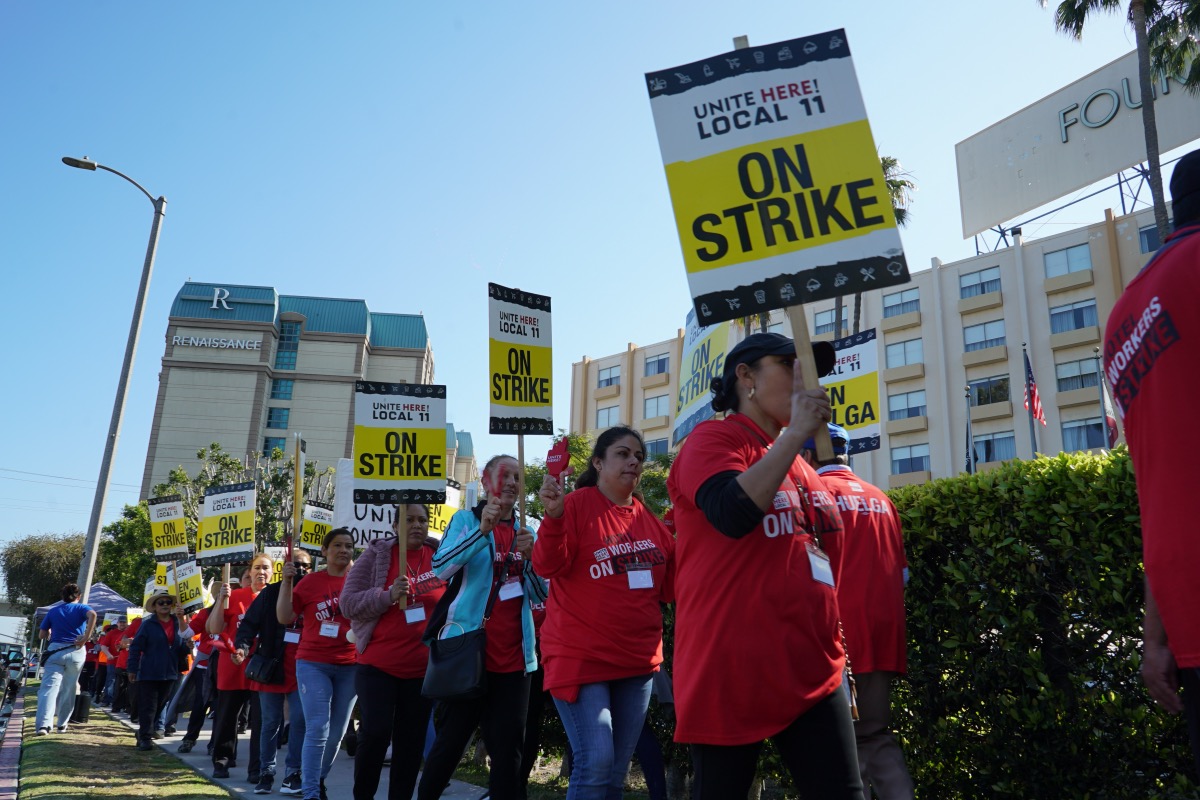

Hotel workers with Unite Here Local 11 picket outside the Four Points by Sheraton across from Los Angeles International Airport, Monday, June 10, 2023. (Mariana Martínez Barba/Latino Rebels)
LOS ANGELES — Early Monday morning, hotels near Los Angeles International Airport erupted with the sound of cowbells, bullhorns, and drumlines as hotel workers marched outside of establishments holding picket signs that read EN HUELGA (on strike).
Part of a second wave in the largest hotel strike in Southern California’s history, the workers are demanding fair, livable wages.
Responding to the expiration of nearly 15,000 hotel workers’ contracts at the end of June, UNITE HERE Local 11 has mobilized across the city to demand a $10-an-hour wage increase. The labor union represents more than 32,000 hospitality workers both in Southern California and Arizona working in hotels, restaurants, airports, and more.
The hotel industry continues to boom nationwide, with Los Angeles itself preparing for major world events like the 2026 World Cup and the 2028 Olympics. The industry currently employs 2,244,618 people across the country, according to a report by IBISWorld. For hospitality workers, however, wages have not kept pace with soaring rents and the cost of living.
Workers at hotels like Sheraton Gateway earn $18.86 per hour, while a report from the National Low Income Housing Coalition says employees should be making approximately $21.25 per hour in order to afford a modest one-bedroom home. The same report says that rents in the U.S. rose by 18 percent between the first quarter of 2021 and that of 2022.
“The reason why tourism is such a profitable industry is because of their workforce—largely immigrant workers,” said Victor Narro, project director for the UCLA Labor Center.
Over the 4th of July weekend, hotel workers began demanding adjustments to their wages in the first series of strikes at hotels across Downtown Los Angeles and Santa Monica. Only one hotel, the Westin Bonaventure, has reached an agreement with the labor union.
“It’s a big issue in Santa Monica,” said Jon Katz, president of the Santa Monica Democratic Club, and a staunch ally of the union. “In some other tourist jurisdictions, people who work in the hotels can live nearby the hotel. But in Santa Monica, the cost of living and the cost of housing is so high.”
According to a UNITE HERE Local 11 survey, 53 percent of workers said that they either have moved in the past five years or will move in the near future due to soaring housing costs.
Johana Alas, 34, has to commute over an hour and 20 minutes to her job at the W Los Angeles in Beverly Hills, as she currently lives with her mother and two young daughters in the San Fernando Valley because she cannot afford to pay rent on her own.
“A lot of us are single moms,” she said. “We can’t maintain our kids with what we’re earning now.”
The second wave of strikes is expected to extend past the weekend, as the union continues its call on employers to negotiate a new contract.
“If we are willing to fight, and continue fighting for what we want, we’ll be able to achieve it,” said Alas.
Latino Rebels reached out to the Hotels Association of Los Angeles for comment but did not receive a response at the time of publication.
***
Mariana Martínez Barba is a summer correspondent at Futuro Media and is currently studying at the Craig Newmark Graduate School of Journalism at the City University of New York. Twitter: @marianamtzbarba


